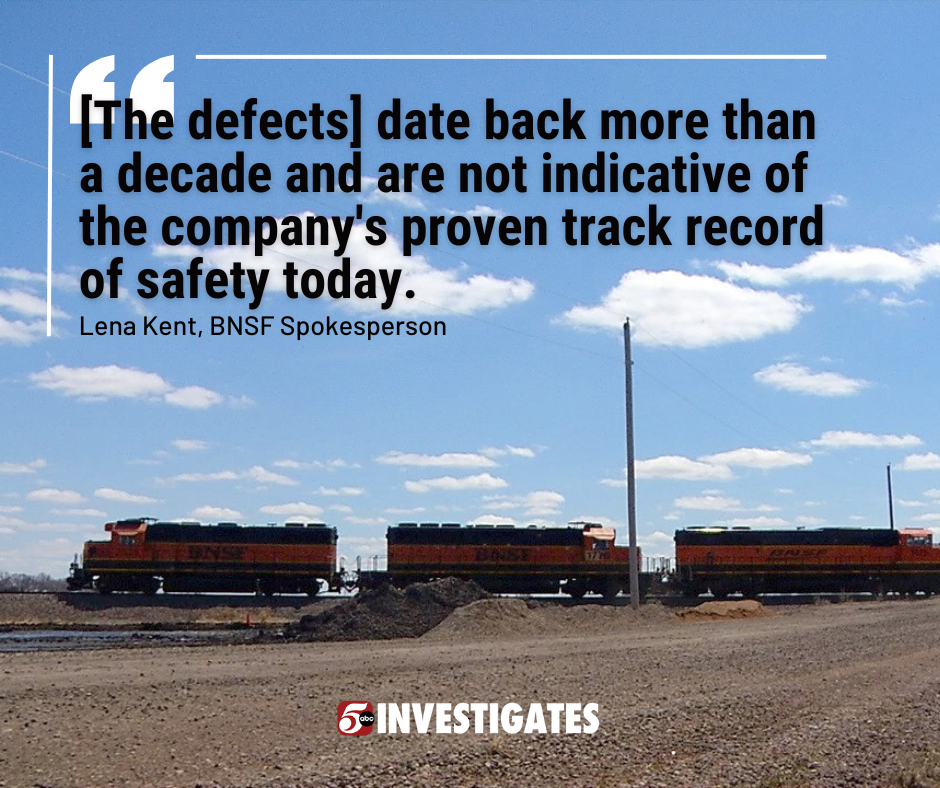‘That’s a lot of defects’: BNSF safety record under scrutiny after derailment in Minnesota
The section of track in Minnesota where a train carrying ethanol derailed earlier this spring had a history of defects that led to employee complaints, million-dollar lawsuits, and federal safety violations, according to court records reviewed by 5 INVESTIGATES.
The derailment of 23 cars on March 30 forced the small town of Raymond to evacuate for several hours as residents feared the worst.
“This is what I worry about. We’ve had so many of them,” said Rose Day, who lives a few blocks from the track.
Burlington Northern Santa Fe (BNSF) is now testing a fractured piece of rail found at the scene of the accident in southwest Minnesota, according to a preliminary report released last month from the National Transportation Safety Board (NTSB).
Lawmakers praised the company after top executives flew in from the company’s headquarters in Texas and addressed the media as the tank cars were still burning.
“We apologize for this. We take full accountability for it, and we’ll continue to be here until this is cleaned up,” Katie Farmer, BNSF president and chief executive officer, said that day.
While that quick response is still drawing praise from residents in town, the company’s safety record is under growing scrutiny.
Red tag defects
5 INVESTIGATES found documented concerns buried in court records over how BNSF responds to safety issues, including on that very line of track.
Those records show that particular 223-mile long section of track — known as the Marshall Subdivision — had nearly 2,000 “red tag defects” from 2000 to 2011.
“That’s a lot of defects,” said Al Blackwell, who reviewed internal company records as part of a personal injury lawsuit in 2014 brought by a former BNSF employee.

Red tag defects are among the most serious and require that trains slow their speed if the track is not immediately repaired, according to a company policy cited in the court records.
“The amount they were having per year, I’ve not seen on any other subdivisions of BNSF, or, for that matter, any other class one railroad,” said Blackwell, who has been in the rail industry for nearly 50 years.
His report stated the company “failed to perform track inspections” and “failed to take corrective or remedial action.”
Two separate Hennepin County juries found BNSF to be “negligent” and “violated federal track regulations,” leading to verdicts totaling nearly $3 million.
“Reporting too many defects”
BNSF did not respond to multiple requests for an interview but defended its rail line in a statement to 5 INVESTIGATES.
Lena Kent, a BNSF spokesperson, said the red tag defects “date back more than a decade and are not indicative of the company’s proven track record of safety today.”
But the company is fighting another legal battle right now involving safety on the tracks.
BNSF is currently appealing a $1.2 million jury verdict from 2021 that found the company retaliated against a former track inspector in Minnesota who said he was fired for “reporting too many track defects.”
“That is very, very concerning,” said State Rep. Frank Hornstein, DFL-Minneapolis, who has been pushing more regulation of the rail industry for years.
“If we have someone telling the truth, someone blowing the whistle. That person’s opinion should be honored and respected rather than dismissed,” he said.
Hornstein also said he was unaware of the previous “red tag defects” on that same line.
“This is the problem with our system. The railroads say, ‘Trust us.’ How can we trust them? In this type of scenario, it’s like the fox guarding the hen house,” he said.
Ohio derailment
Questions about railroad safety started to intensify after the Norfolk Southern train derailment in New Palestine, Ohio, earlier this year.
“The media is onto this now all over the country,” said Blackwell, the industry expert.
Hornstein says the records obtained by 5 INVESTIGATES only elevate those concerns.
“The issue with these defects, it’s very serious,” he said. “These trains are carrying hazardous materials, whether it’s oil, whether it’s ethanol, whether it’s other flammable and corrosive and explosive freight, our communities are at risk.”